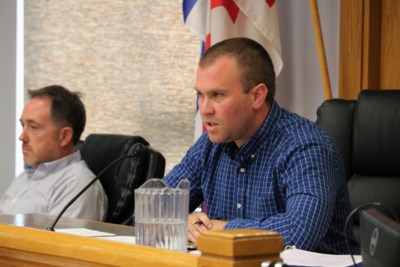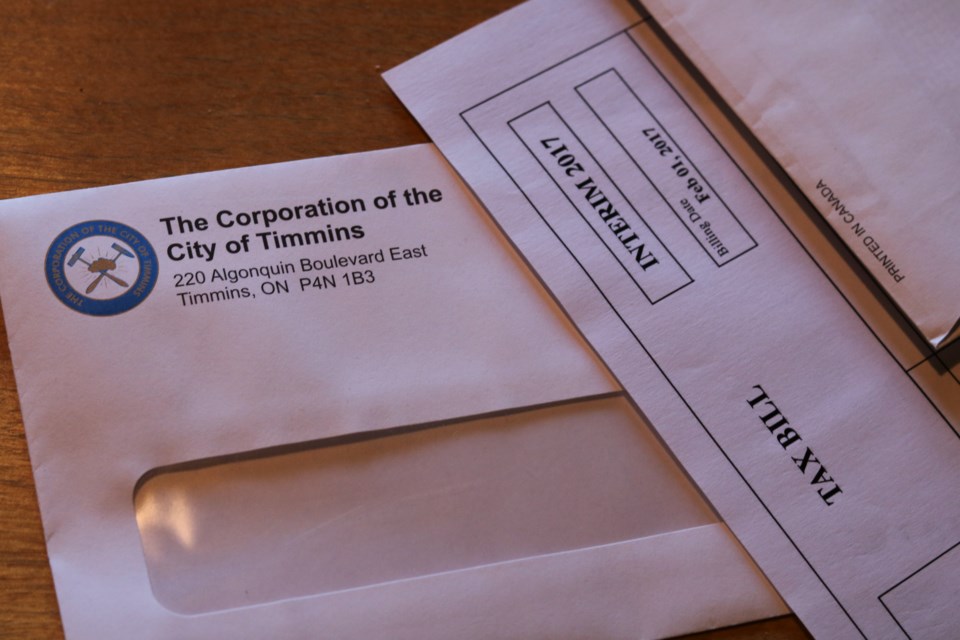After an extremely tough year for major industrial property re-assessments, Timmins city council has approved the latest tax ratios.
Residents will see a 2.14 per cent increase, plus or minus what each property's latest MPAC (Municipal Property Assessment Corporation) change was.
For example, if a property saw a two per cent increase in their assessment, that would be added to the 2.14 per cent, for a total increase of 4.14 per cent. The average increase per household according to Mayor Steve Black and Councillor Joe Campbell is $125.
However, residents could have been on the hook for a increase of between eight and 10 per cent without new tax agreements with three major industrial properties, who saw their overall assessment drop significantly due to circumstances such as demolition of buildings. The city was attempting to reduce the burden on residents with the agreements.
"What we wanted to accomplish really in these negotiations, was setting us up to have a solid four-year plan for tax rates and have some stability. So I think these tax agreements have put us in a great starting position compared to where we would have been if we had to accept that assessment loss, to keep relatively stable tax rates next year, and hopefully we'll able to get even lower than where we are out of the gates. I think we're in a great position there," said Black after the meeting.
Voting in favour of the new rates were Councillors Pat Bamford, Mike Doody, Noella Rinaldo, Andrew Marks, and Mayor Black. Opposed were Councillors Joe Campbell, Rick Dubeau, Veronica Farrell, and Walter Wawrzaszek.
Along with the 2.14 per cent residential increase, commercial tax rates are going up 5.81 per cent, industrial up 5.80 per cent, but large industrial is down 11 per cent compared to 2016.
Black told reporters that the tax agreements will give the city some stability going forward into budget deliberations not just this year, but the next four years.
 Mayor Steve Black speaks at Wednesday's special meeting. Andrew Autio for TimminsToday
Mayor Steve Black speaks at Wednesday's special meeting. Andrew Autio for TimminsToday"We had that discussion with the companies as we were going through this. We didn't want to see the residents have to see a large increase at any point in time over the next four year period, and at the same time have competitive industrial rates, so I think we're in a good position entering next year. I fought really hard to get four year agreements with the mining companies. We had some discussion about two, and at certain points our Director of Finance was leaning towards accepting the two years. I said I didn't want the two years, I want four year agreements to provide that stability, so we can come up with a plan to transition off the reliance of the large industrial assessment that we're going to be losing with Kidd, as well as have stable residential tax rates. So I think we're in a good position going forward, and these agreements will make the next couple of years a much easier process for councils to get through the budget process," he said.
Farrell told TimminsToday her rationale behind voting against the tax increase.
"We've been asking the people of Timmins for a lot this year, to spend money on different things, and it's not fair that we have to increase their taxes to do it. I think personally, there are ways that the department heads can come back and not spend as much money as they've asked for, if they really really look into what they've got, I'm sure they can make some adjustments and not have to spend all the budget we've given them."
"Yes I am for the pool, and yes I was for Stars and Thunder, but I'm not for taxes to be raised. We ask our people for a lot, we shouldn't have to ask them to pay more," she said.
Farrell, who recently retired, acknowledged that her perspectives are changing as she immerses herself in the complexities of municipal politics.
"I'm hoping the 2018 budget is going to be a better budget than we had this year. This was an experience for me, I've only been here for a few months, I've learned a lot. So now that the 2018 budget is coming, I'm more aware of what people are asking for," she said.
Black said that the city could now become more attractive to new business and industrial operations.
"I know we're a lot more competitive today than we were yesterday, which puts us a better position in some of these discussions going forward. Trying to attract other investment, not just the current projects that are on the table, but when you're looking at working with other partners and attracting them to come to Timmins, having those lower tax rates is something that we constantly hear. We were able to get there on the large industrial side now with these agreements."

